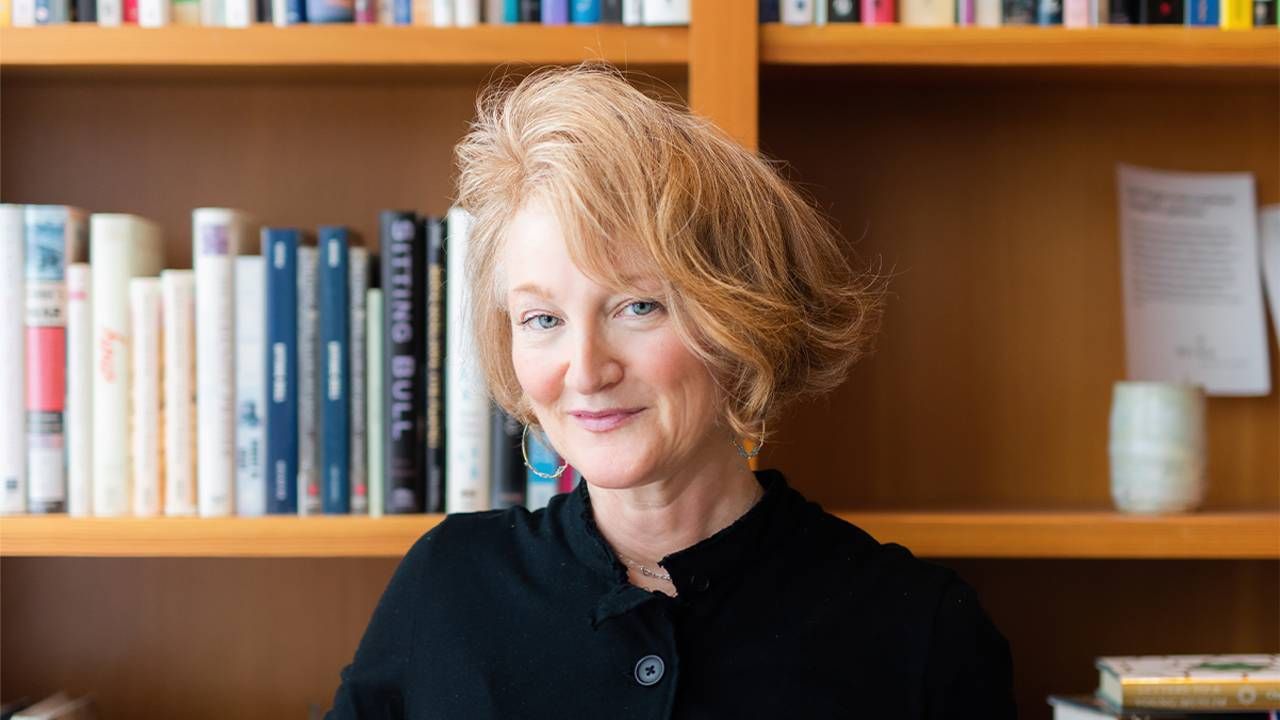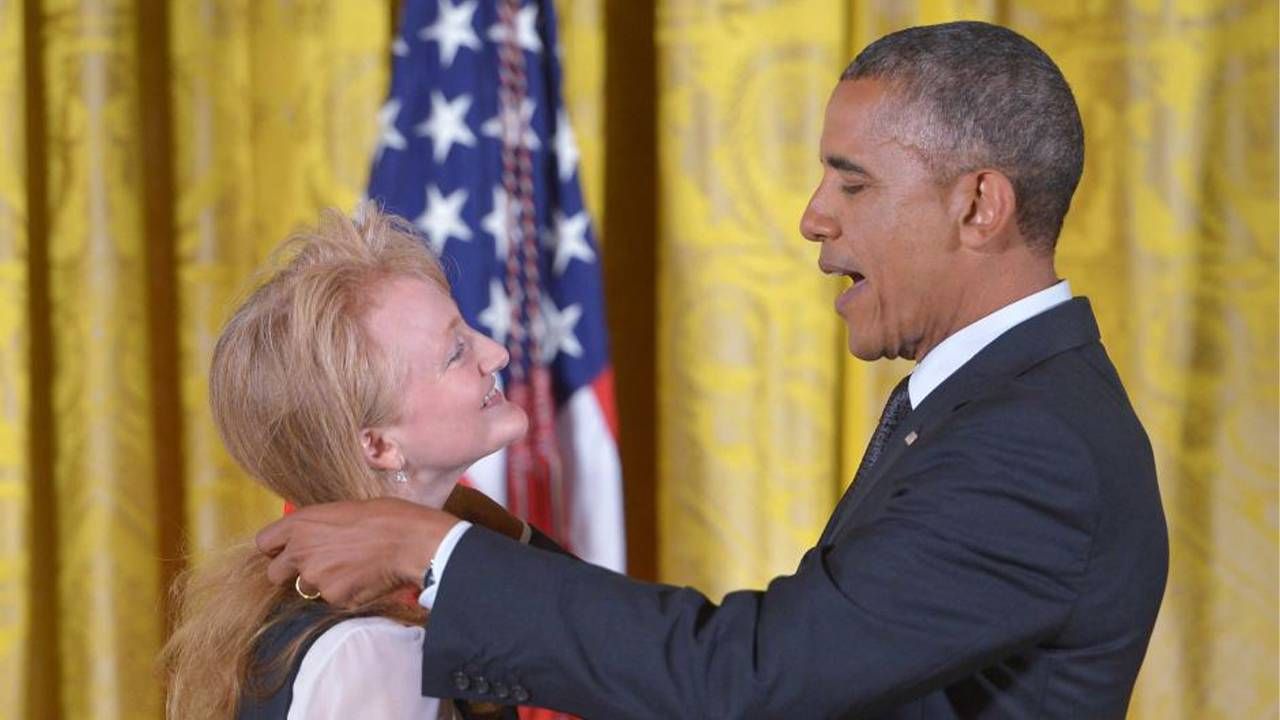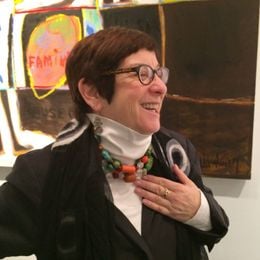On Being Krista Tippett: Holding Body, Mind and Spirit Together
The host of the 'On Being' public radio program on how we must 'learn to walk alongside each other to do the work that must be done'
We're naturally drawn to individuals with high emotional intelligence – people who make others comfortable and at ease with their easy rapport. They seem to read social cues with superhuman ability. Which describes public radio and podcast host, Krista Tippett, who has transplanted the essence of the so-called EQ (emotional quotient) movement from books and Harvard Business Review pages to public radio airwaves.

In 1999, her radio program, "On Being with Krista Tippett" (originally called Speaking of Faith) became a game changer, nudging a civil conversational format into the sphere of tumultuous, loud and angry talk radio. Initially assigned to the 7 a.m. Sunday "God slot" on Minnesota Public Radio (MPR), even Tippett's earliest champions were skeptical that the series would take off.
"On Being" is now entering its 23rd year of broadcast, reaching 658,000 listeners over 400 public radio stations weekly; the podcast has been downloaded over 350 million times.
The show has earned a Peabody and multiple Webbys, some of broadcasting and digital media's highest awards. As impressive, in 2014, Tippett found herself standing face-to-face with President Barack Obama as he gave her the prestigious National Humanities Medal, recognizing her work as "thoughtfully delving into the mysteries of human existence."
'On Being' Shines a Spotlight on Human Goodness
From the beginning, the show has concerned itself with topics beyond faith and religion, asking the big questions: What does it mean to be human, how do we want to live and who will we be to each other?
"I'm always trying to attend to this trajectory of where this time in the world is...of what it is."
From the first question to the last, Tippett shines a spotlight on human goodness, hosting guests ranging from Pulitzer and Nobel prize-winning authors, actors, theologians and scientists to less well known social and civil rights activists and poets.
During our recent wide-ranging, one-hour conversation in her Minneapolis studio, Tippett shared both personal and professional matters.
The 61-year-old New York Times bestselling author and journalist reveals how deeply the ongoing unsettledness of the past 18 months of pandemic and global social unrest has impacted her – more than her listenership might determine from her legendary, even-keeled on-air personality.
Initially expressing relief at simply having made it through the past few years with her "health and livelihood," she quickly pivots, speaking through her more familiar radio host persona: "We've been able to be useful to people, right?" she asks. "I mean, we really offer something that helps. We try to hold body, mind and spirit together. And that does feel like a responsibility to me."
A Unique Experiment in Generative Dialogue
In conversation with Tippett, one cannot miss just how accountable she is. Tippett and her life's work seem inextricable.
Her idea for "On Being" – this unique experiment in generative public dialogue, underpinned by deep philosophical conversations – assuredly filled a gaping media hole. Where no one else did, Tippett sensed there was an audience hungry for programming that The Washington Post declared, "challenged all forms of dogma, in science, politics, and philosophy, as well as religion…." And she understood that public radio was the perfect platform.
Living in the increasingly fractured and polarized times we do, Tippett has dedicated her life and talents to bridging the schisms. "I'm always trying to attend to this trajectory of where this time in the world is…of what it is," she says.
Then, exhaling softly, she posits a characteristic, "On Being"-style reflective question: "I mean, how do we learn to walk alongside each other to do the things that must be done?"
Paradoxically, answering this question is not the point. The alchemy of "On Being" is asking the questions – engaging graciously in the tough conversations – a formula that on the surface seems to fly in the face of successful programming.
Friend and fellow public radio show host MPR's Kerri Miller, admires Tippett's courage of swimming against the currents.
"Krista definitely influences the way I think," Miller says over the phone. "I have great admiration for her work, covering faith in way that accessible." She continues, "We share a common way of thinking, a curiosity. Krista doesn't cover hard news, but the ocean she likes to swim in is one of astute observations."
Seeking Social Change
Those not familiar with Tippett's past might be surprised at the road that's taken her here.
Born in the small town of Shawnee, Okla., granddaughter of a loving, albeit fiercely conservative Evangelical minister, Tippett felt stifled. Escaping to Rhode Island's Ivy League Brown University after high school, she landed a student stint in the former East Germany – behind the Iron Curtain. Later, she returned to the region on a Fulbright scholar, reporting for several prominent news sources including The New York Times, Newsweek, the BBC, the International Herald Tribune and Die Zeit.

Her efforts got her noticed. Tippett became a junior diplomat in West Berlin, working on the other side of Checkpoint Charlie, ultimately serving as chief aide to the U.S. Ambassador to West Germany – a nuclear arms expert and a Reagan appointee. During this period, Tippett describes herself as, "a thoroughly political person."
But these heady years of politics and dinner parties in the halls of power left the young Tippett oddly empty. Something was missing.
In her 2007 book, "Speaking of Faith," she reflects about how those living freely in the West often took their freedoms for granted, squandering their social capital, while those suffering under a repressed rule in the East surfaced a fierce fortitude of hope – akin to spirituality.
Throughout her work on both sides of The Wall, Tippett's personal goal emerged strong and clear: she sought social change. How and where, she wondered, would such change surface?
For Krista Tippett, Self-reflection Fuels Societal Change
Slowly, the answer began to emerge. In fact, it has driven all her subsequent efforts.
"In Berlin, I learned that transcendent goals like peace and justice are always made possible, or rendered impossible, by the patterns of the human heart," she writes. "The human condition is the reality around which political life revolves – and upon which it falters. Even the highest levels of diplomacy and geopolitical strategy are about treating the symptoms of humanity."
"The human condition is the reality around which political life revolves — and upon which it falters."
"What my interest in life is," she tells me, "is the human dimension of things, the human condition."
Certainly, Tippett's personal life has tested her. Being a wife and becoming a mother were her sacred trusts. Divorcing felt like failure, prompting an unexpected darkness of the soul. Therapy sessions helped Tippett regain her sense of self, and that is where she discovered the healing power of guided conversation.
Slowly emerging from her depression and coming to terms with her self-doubts, Tippett turned to theology, earning a Master of Divinity from Yale University. That led to an oral history project for the Collegeville Institute for Ecumenical and Cultural Research at St. John's Abbey in Collegeville, Minn.
The interviews she conducted for this project took her around the globe, reinforcing the power of guided conversations to surface self-reflection. Tippett credits the St. John's Abbey project as a direct source of "On Being."
All You Need Is Love
Tippett is greatly inspired by Austrian philosopher and poet, Rainer Maria Rilke. Of his many works, she finds this quote one of his most motivating: "Love is perhaps the most difficult task given us, the most extreme."
At the intersection of personal and professional life, motherhood is synonymous with love for Tippett. "When I became a mother, I believed, and still believe, that when all is said and done, none of us will be measured on how much we accomplish but on how well we love," she writes.
"I had a real evolution in my understanding of love," she explains. "I realized after my divorce there was a point where I was feeling sorry for myself … that I didn't have love in my life. I was able to stop and say, well, yeah, that's not true at all. There's this one particular way of love that is not present in my life right now, but I have so much love, so many forms of love."
It is obvious how much she cherishes the love of her grown children, Aly and Sebastian, and how loving them requires learning new ways of expression.
"It's so interesting to continue to watch your children become who they are, right?" she says. "And you have to keep getting to know them over and over again."
'On Being' Is Always Evolving
As challenging as it is to learn new ways to love one's growing children, it is difficult, if not foolhardy, to tinker with a successful business formula. Yet, Tippett's superpower is the wisdom to know when to evolve.
In 2014, Tippett and three colleagues, Trent Gilliss, Chris Heagle and Liliana Maria Percy Ruiz, launched "On Being" as an independent nonprofit enterprise.
Tippett described the break from her public radio home as "going from a radio show embedded in a media organization to a social enterprise with a radio show at its heart."
"We're depleted, right? And it's a tricky thing to be depleted and called at the same time."
The risky move proved successful. "On Being" relocated to a spacious former retail warehouse building in the Minneapolis Loring Park neighborhood, expanding its offerings, staff and impact. Through the Civil Conversations Project & the Social Healing team, "On Being" has operationalized its mission, touching people more directly.
"The project has always been emergent," Tippett says. "At our core, we've always been listening to our listeners, as much as we were listening to our guests – we've never been static."
A Brave 'Betazoid'
Towards the end of our conversation, I ask what keeps Krista Tippett up at night, and what gives her hope.
"Well, right now there's so much pain in the world," she replies, with so much emotion in that legendary velvet voice that I inadvertently blurt out: "You're just like Deanna Troi on 'Star Trek,' aren't you?"
"I am," she laughs heartily. "I am half-Betazoid, you know? Sometimes I'm better at not letting it in, but right now it's coming over me in waves."
The years of quarantine and unrest have taken a slight toll on Tippett's stamina. "We're depleted, right? And it's a tricky thing to be depleted and called at the same time," she admits.
However, she insists that perhaps the world needed to be shaken up. "I think we almost needed an earthquake to change the way we live," she says. "It's existential for our species not just to want to survive, but to flourish, so these past years are an invitation to make the magnitude of our transformation more fluent."
The movement of the world's tectonic plates has driven home the positive impact the "On Being" project has on the lives of her listeners. "The people who come to us, who hear the show, are such a beautiful counter-culturally broad array of people," Tippett says. "I think of them as the ones who are really building the generative story of our time."
This fact that power of human goodness typically doesn't make headlines is never lost on Tippett. Her work isn't loud, but she sees it as a "goodness that doesn't yell, and doesn't have publicists, but it is happening all around us."


